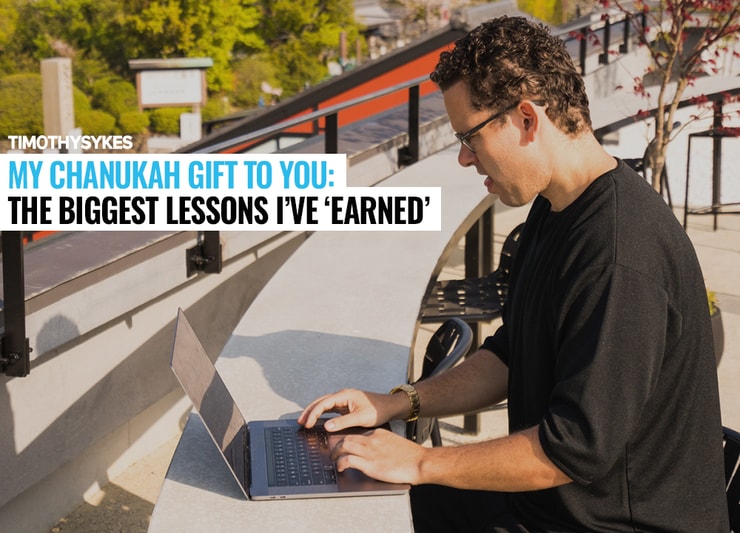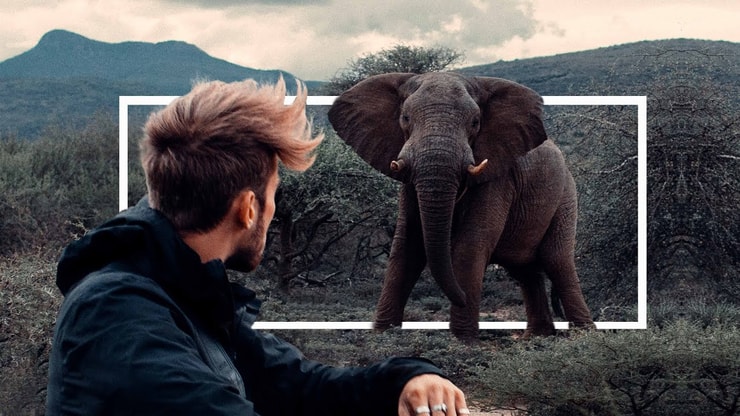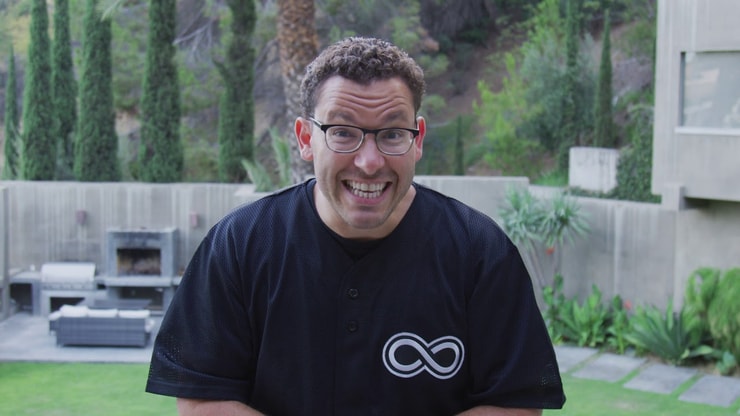Hey everyone, Happy Chanukah! I love this time of year. I get to dress up in my Hanukkah Harry (remember the SNL character?) suit and hand out Chanukah gifts. It’s awesome.
Today I want to share my reason why with you. There’s a lot of talk in the entrepreneurial world about ‘reason why.’ People ask me sometimes, “Tim, what made you want to be a penny stock trader? What made you want to teach? What’s the Trading Challenge? What about your charity work?”
Actually, I wish more people asked about the charity work. Most people want to see the Lambo and wads of cash on Instagram. To be honest, there comes a point where more ‘stuff’ is just boring. Yeah, it’s fun. Especially when you first get it and you’ve never had it. But it doesn’t make you happy. Material stuff doesn’t give your life meaning.
Table of Contents
Lessons Earned
Some of you know my story but others don’t. There are lessons here. Even if you know the story you might be surprised by a few nuggets of gold.
Here’s the short version …
Like many other entrepreneurial types, I started learning about business when I was a kid. I collected tennis balls in the woods behind the local country club and sold them to my neighbors for a quarter apiece. I was a scrapper — made a couple hundred bucks at it!
In junior high, I traded baseball cards — at one time dedicating my entire being to it. I learned a lot about how markets work. I made wishlists for birthdays and holidays. I asked for complete sets from the 1980s, hoping to cash in on rookie cards for the likes of Barry Bonds and Roger Clemens.
Unfortunately, these sets were mass produced and many adult collectors also bought them and stashed them away. The prices for the rookie cards never went up that much because demand never overcame supply. Still waiting on those, all these decades later. Little did I know that my strategy was the classic buy-and-hold investing strategy.
My next venture was re-stringing tennis rackets. I started playing tennis at the age of six and wanted to be a pro. I had a powerful serve — which led to strings breaking more often. I was paying the local pro shops over $50 a pop to string my rackets.
I talked my parents into buying a stringing machine to save money. Once I got good at it I started charging others — undercutting the local pro shops. Pretty soon business was booming and I was skipping homework to string rackets. Then I did something stupid.
Take note of this …
… lesson earned.
I started cutting corners. Some rackets were difficult to string so I drilled the holes bigger to string them faster. Nobody noticed. I drilled bigger holes in my rackets as well. Then, in my senior year of high school, tragedy struck.
I think it was self-imposed.
Like I said, I wanted to be a pro. I was dedicated. I was focused and driven. I changed my diet, upped my practice routine, started lifting weights …
… all good, right? Strong character, work ethic, self-discipline…
… Except for cutting corners with the rackets.
That was a shortcut. I believe the shortcut had consequences. I’m no medical expert but I have a feeling that practicing and playing with those rackets had something to do with my injury.
The Million-Dollar Injury
Senior year of high school I ended up needing surgery on my arm. It was Tommy John surgery, where they take something out of one arm and put it in the other arm. So I’m walking around with two casts and I couldn’t do anything.
While I was recovering, my parents, in all their beautiful wisdom, gave me roughly $12,000 of my bar mitzvah gift money to start playing the stock market.
Back then my parents thought I would lose it all. Now my dad calls it the ‘million dollar injury.’
Off I went to make my fortune …
… But it wasn’t overnight success. Not at all. I started by losing money.
I tried investing; the buy-and-hold strategy. But my account was basically going up and down a little. There was no real movement. I found that totally unsatisfactory and I was impatient.
I realized fast that I wanted to learn to trade stocks. So, like everything else I’ve told you about, I went all-in. I studied my ass off. I was so focused I started taking 20+ minute bathroom breaks from class to do research on the computers in the school library.
Eventually, I started skipping class. My parents weren’t too happy when the principal called them in to tell them I was skipping. They were dismayed but went easy on me — only because I’d already got into Tufts University through tennis.
After a year I’d managed to turn $12,415 into around $120,000.** It was all based on patterns I saw in the market. Specifically, in penny stocks. By the end of freshman year at Tufts, my account was up to $800,000.** It was crazy. I was a little lucky. But more important than luck was focus and discipline.
More Breaking News
- Valterra Platinum’s Q4 Forecast Drives Anticipation Amidst Earnings Surge
- Morgan Stanley’s Bold Moves Boost Cipher Mining’s Prospects
- Bitmine Immersion Technologies Secures Strategic Edge with $14 Billion Crypto Holdings
- Datadog Sees Price Target Shifts Amid Market Changes
Focus and Discipline Lead to Winning
I hope from everything you’ve read so far you see the common thread: focus, study, discipline, and hard work. I was a middle-class kid. We weren’t poor but we definitely weren’t rich. If I wanted something, I went for it. Sometimes it worked out and sometimes the results were awful — but every failure was a lesson earned.
I’m constantly going off in my videos about studying. Study like crazy! Look, when I was still in high school I read every financial book in my dad’s library. He was a financial planner, so there were a lot. I was determined to learn as much as possible, as fast as possible.
I also watched hour after hour of CNBC. I stopped hanging out with friends and kept a stack of notecards with investment research on them. You might say I became obsessed. But the reality is, I got focused. I continued to develop a sense of self-discipline.
Check this out — Jewish tradition teaches that after you’ve done new things consistently for some time, you become a new person. Who you are changes based on what you do. Your new skill or knowledge — whatever you put time and energy into — changes you.
I’m going to come back to this later because it’s part of what I’m doing by giving to charity and raising money to build schools and save endangered animals. And it’s part of what I want you to do to change how money flows through your life.
I might even get into some of the philosophy behind it but I mostly want to plant a seed. Because that’s what happened to me as I immersed myself in trading. I changed because I became knowledgeable. My mind changed because I started to recognize patterns in the market.
Before I go any further, I believe all this is possible for you. After a period of dedication and doing the work, you change. You’re not the same person. You think different, you have a different perspective. If you’ve ever practiced anything — like a musical instrument or sports — you know what I’m talking about.
By the way…
… The same goes for doing things the wrong way. It changes you. Think about that.

This is why it’s so important to create good habits for yourself. Good habits change you over time. I believe they can override bad habits. It’s all about focus and discipline. Stay focused and soak it all up like a sponge. Be disciplined.
Have self-discipline to keep growing and learning…
… and the discipline to act on what you learn.
I had some hard lessons in discipline early on in my trading career. But those lessons shaped me and made me a better trader. They reminded me to be patient, to maintain discipline, and to be less impulsive.
Lack of discipline ruins a lot of traders. The ones who lose — reportedly around 90% — they’re like gamblers. Once you’re ruined it’s more difficult to help others. Which is what this is all about.
Long story short, I managed to become a millionaire in about a year and a half.** Like I said, I was a little lucky. I was in the right place at the right time. The market was hot and the patterns were easy to see. But focus and discipline were key to winning.
After I became a millionaire at such a young age I started a hedge fund. You can read about it in my book “An American Hedge Fund.” The thing is, even though focus and discipline got me where I was, I was still driven by making lots of money.
I wanted a lot of money and material things. I wanted to “make it.” Here’s the deal …
… once I had all those things …
… like a Lamborghini, a Ferrari, and a mansion in Miami Beach …
… it didn’t lead to happiness.
Over time I realized that none of the material stuff led to happiness.
Teaching others, that makes me happy. Helping a little boy in Miami get a machine so he can talk to his mom for the first time, that makes me happy. Saving a rhino that’s had its horn chopped off by poachers, that makes me happy.
That’s what this is all about. Look, I want you to have the life you’ve dreamed of. And I believe you can if you put in the work. I want you to dream bigger than you’ve dreamed before. But I also want you to change your mindset about money and giving.
This is so important. It’s waaaay more important than learning how to take advantage of a morning panic (you should learn that, too). This is about how money flows around and through your life. It’s how all your dreams can come true.
Karmagawa
Once all this became clear I knew it was more important to teach others than to make millions trading. I’ve made wads of cash trading.** I still do. But the real Chanukah gift is to help others. This is the realization that led to Karmagawa, the charity I co-founded with Matt Abad.
Remember up above when I said that if you do something consistently, over time, it will change who you are? That’s what this is about. Want to change your lifestyle? Then change who you are.
Karma is often defined as the result of a person’s actions, or destiny. But if you break it down even further it gets pretty interesting. In Sanskrit, kar means ‘making, doing, or lord of.’ Ma is the root for ‘me’. So you could translate karma as ‘what I do to myself.’ More to think about.
Gawa is Tagalog for ‘do or make’. Karmagawa, then, means to make your own destiny. It could even mean ‘that which I do, I do to myself.’
You Get What You Give
In other words, the more good deeds you do, the more positive your destiny…
… What comes around goes around …
… As the call, so is the echo …
… Every good act encourages another in its wake…
The sayings from different cultures, philosophies, and religions could fill a whole page. They all mean pretty much the same thing. Whatever you put out there is coming back. That’s why the logo for Karmagawa is the infinity symbol. It represents this idea of the flow of energy.
Guess what?
Surprise, surprise — it works with money and wealth. If you want to be rich, you should start giving. I know, some of you are reading this and saying, “But Tim, I have no money, nothing to give. How do I break free of this cycle?”
Check this out: If you tell me you have nothing to give right now, I say you have a poverty mentality. I’m not dissing the poor. I want to help the poor. I want them to understand the opportunities and the possibilities. No matter where you are right now, today, you can create a better mentality about money and giving. It will change you as a person.
How to Give if You Have No Money
Here’s the friggin’ awesome thing about how this works: you don’t have to give money.
You could volunteer at a soup kitchen. You could help an old lady cross the street (ask politely; don’t assume she wants your help — she might be in better shape than you!). You could give a sandwich to a homeless person.
If you’re really feeling like you’re stuck right now, follow Karmagawa over on Instagram. Seriously, it’s inspiring. If you start every day with a little inspiration it can only help.
A word to the wise: There are pictures over there that will break your heart or make you angry. Others will inspire you. I hope you’re inspired to do better, to be better, and to grow.
Look, I have everything I need. It’s an amazing problem to have. I have toys. I travel. I’ve lived in mansions and penthouses. Whatever. It’s cool, but it quickly becomes this soulless existence. I call it the Kardashian mindset. Screw that! I want to do good and help others.
You ever play video games? Off subject but it will prove my point: What happens when you get to the end? You’ve won the game, but how do you feel? It’s a big emotional letdown. Making wheelbarrows full of money is like that.
“I’ve won the game …
… “I’m at the end …
… “Why am I not happy?”
(Don’t get me wrong: Driving the Lambo is fun. Sort of. It’s also scary as hell.)
So what are you going to do with all this information?
Go out and help someone. Talk with someone who’s depressed and just needs an ear and a meal. Wait, you want hot stock picks? Learn to trade so you can get what you need and then give to others. Money buys you freedom, not happiness. I love the freedom. And I love helping others.
You want happiness? When you can freely give to those in need, when you can give hope to someone who sees no future, when you can teach others to live a life of freedom …
That’s happiness.
What are you gonna do?
I’m grateful for you all — and I love you all. I love my Trading Challenge students. I love my parents (thanks for all you taught me and for letting me earn some lessons the hard way). Now let’s go change the world. Want to help yourself? Help others.
Helping others — changing people’s lives — is underestimated in society. It has bigger implications than most people realize.
Karmagawa is here to change that. Remember when I said I want you to dream bigger dreams? This is my bigger dream. Let’s go get this. Learn what you need to learn and help others every chance you get.
Now go get yourself some Karmagawa swag already. Boom!
Peace out. Happy Chanukah.
What challenges are you trying to overcome? How do you plan to change? Share your comments below. I love hearing from you!





Leave a reply